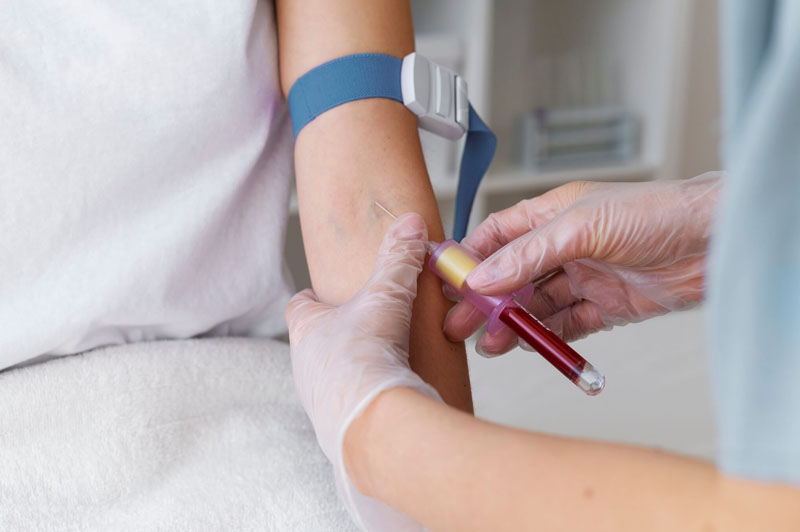Blood tests are fundamental tools in the diagnosis and monitoring of various health conditions. Through a simple blood sample, doctors can gain valuable insights into the overall state of the body and detect signs of diseases before obvious symptoms appear.
7 Essential Blood Tests
Below, learn about the most common blood tests and what they can reveal about a person’s health.
1. Complete Blood Count (CBC)
The complete blood count, also known as a full blood count, is one of the most requested blood tests. It provides detailed information about three key components:
– Red Blood Cells (Erythrocytes): Transport oxygen from the lungs to the rest of the body.
– White Blood Cells (Leukocytes): Part of the immune system and help fight infections.
– Platelets: Play a crucial role in blood clotting and help stop bleeding.
What can a CBC reveal?
A CBC can indicate a variety of conditions. For example, low red blood cell levels could suggest anemia, while a high white blood cell count might signal an infection or, in some cases, diseases like leukemia. Low platelet levels can increase the risk of excessive bleeding, while high levels may indicate inflammatory or clotting disorders.
2. Lipid Profile
The lipid profile measures the amounts of cholesterol and triglycerides in the blood, fatty substances that are essential for cellular function but can be harmful in excess.
What does the lipid profile measure?
– Total Cholesterol: The total amount of cholesterol in the blood.
– LDL Cholesterol (Low-Density Lipoprotein): Known as “bad cholesterol,” excess LDL can build up in the arteries and increase the risk of heart disease.
– HDL Cholesterol (High-Density Lipoprotein): Considered “good cholesterol,” it helps remove LDL cholesterol from the bloodstream.
– Triglycerides: Another type of fat that can accumulate in the arteries and increase the risk of heart disease if levels are high.
What can a lipid profile reveal?
This analysis is crucial for assessing the risk of cardiovascular diseases, such as heart attacks or strokes. An altered lipid profile, with high levels of LDL or triglycerides and low levels of HDL, may suggest the need for dietary changes or the introduction of medications to lower cholesterol.
3. Fasting Blood Glucose
This laboratory test measures the amount of sugar (glucose) in the blood after a fasting period of at least 8 hours.
What can a glucose test reveal?
High glucose levels may indicate diabetes or prediabetes, conditions in which the body cannot properly regulate blood sugar levels. This test is essential for diagnosing and monitoring these conditions, helping doctors adjust treatments or recommend lifestyle changes.
4. Liver Function Tests
Liver function tests measure the levels of enzymes and proteins produced by the liver, indicating how well this vital organ is functioning.
What is measured in liver tests?
– Alanine Aminotransferase (ALT) and Aspartate Aminotransferase (AST): Enzymes that, when elevated, may indicate liver damage.
– Bilirubin: A pigment produced by the breakdown of red blood cells. Elevated levels may suggest problems with the liver or bile ducts.
– Albumin: A protein produced by the liver. Low albumin levels may indicate chronic liver health issues.
What can liver function tests reveal?
These tests can detect diseases such as hepatitis, cirrhosis, and the adverse effects of excessive alcohol or medication use. They are also useful for monitoring liver function in patients already diagnosed with liver conditions.
5. Kidney Function Tests
Kidney function tests, such as blood urea nitrogen (BUN) and creatinine, evaluate how well the kidneys are filtering waste from the blood.
What do kidney tests measure?
– Creatinine: A waste product generated by muscles that the kidneys must eliminate from the body. High creatinine levels may indicate decreased kidney function.
– BUN: This measures the amount of nitrogen in the blood that comes from urea, a waste produced by the liver when it breaks down proteins.
What can kidney tests reveal?
Abnormal levels may indicate kidney issues such as renal failure, urinary tract infections, or chronic kidney diseases. These tests are especially useful for people with diabetes or hypertension, as both conditions can damage the kidneys over time.
6. Electrolyte Test
Electrolytes are minerals found in the blood that are essential for many bodily functions, including nerve impulses, muscle contraction, and fluid balance. Common electrolytes include sodium, potassium, calcium, and magnesium.
What can an electrolyte test reveal?
Imbalances in electrolyte levels can indicate a variety of health issues, including dehydration, kidney diseases, or excessive use of diuretics. Low or high levels of sodium or potassium, for example, can cause severe symptoms such as muscle cramps, heart arrhythmias, and, in extreme cases, even death.
7. Thyroid Test (TSH)
The thyroid-stimulating hormone (TSH) test measures the levels of this hormone in the blood to assess thyroid gland function.
You may also be interested: The importance of regular gynecological exams
What can a TSH test reveal?
Abnormal TSH levels may indicate conditions such as hypothyroidism (when the thyroid does not produce enough hormones) or hyperthyroidism (when it produces too many hormones). Both conditions can affect metabolism, mood, weight, and cardiovascular health, requiring appropriate medical treatment.
The most common blood tests provide a window into the overall health of the body and are essential for diagnosing and treating various diseases. Regular blood tests, as part of annual medical check-ups, are a fundamental preventive measure for maintaining long-term health.
Schedule an appointment now at Doctor Urgent Medical Care to receive the attention you need and improve your lifestyle. Your well-being is our top priority!





